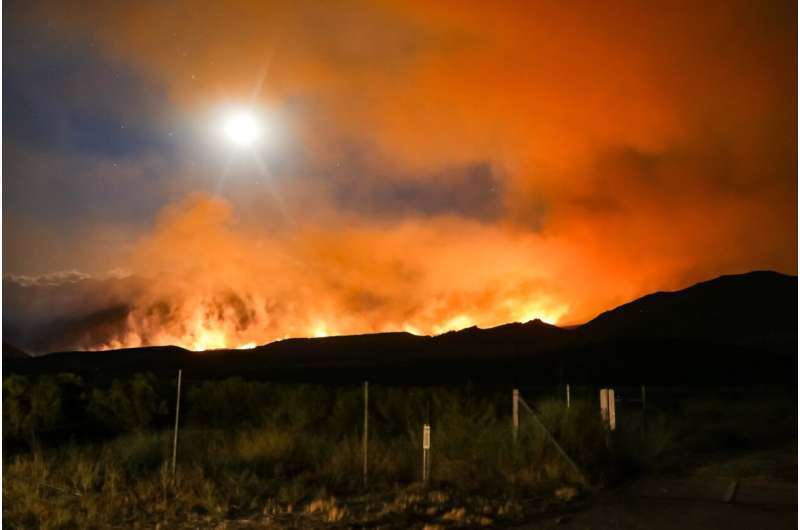Research reveals how experience with climate-related disasters affects willingness to take and accept protective actions

Two new studies—a survey of residents in hurricane-battered Florida and Texas and a survey of people in wildfire-scarred California—reveal that negative personal experiences are among key variables in pushing people to take or accept protective measures like flood insurance and planned power shut offs. The wildfire survey, published in Energy Research & Social Science, is among the first analyses of people’s views of climate adaptation policies enacted by companies rather than governments. The hurricane survey, published in Environmental Research Letters, includes populations, such as elderly and poor people, that are often overlooked in such research. Both papers’ findings could inform public communications and policy to help vulnerable communities protect themselves from these and other extreme events.
“As catastrophic wildfires, hurricanes and other events increase in frequency, they are having severe emotional, social and economic consequences on people’s lives,” said Gabrielle Wong-Parodi, an assistant professor of Earth system science at Stanford’s School of Earth, Energy & Environmental Sciences (Stanford Earth), lead author of the hurricane study and sole author of the wildfire study. “It is imperative that we design ways to mitigate those impacts with an eye toward empowering vulnerable communities.”
Wildfire survey
The 2018 Camp Fire, California’s most destructive and deadly wildfire in recorded history, was sparked by power lines belonging to Pacific Power & Gas (PG&E). Every fire season since, PG&E and Southern California Edison, the dominant utilities in northern and southern California, have instituted temporary public safety power shutoffs to ensure their wires don’t contribute to conflagrations during times of particularly high wind and heat. These shutoffs affect millions.
While they may reduce the risk of wildfires, public safety power shutoffs may also impact health and normal daily activities by making it impossible to use certain home medical equipment, store food safely, attend school or perform work. In a previous pilot study, Wong-Parodi, found that such shutoffs—and, in some cases, even just the threat of shutoffs—were associated with poorer physical and mental health, especially among those living in households with medical concerns, children under 5, adults over the age of 65 and people with extremely low-income.
Wong-Parodi’s newly published wildfire survey shows that people with more personal experiences in terms of health and exposure to hazards, such as poor air quality, were more likely to worry about such risks. In turn, they were more likely to support power shut offs. However, people worried about possible negative impacts from shutoffs were less likely to support them.
These findings make clear that communications about power shutoffs that are sent to households in areas affected by wildfires should consider their vulnerabilities and risks, according to Wong-Parodi. She suggests that public utilities work with local municipalities, community organizations and health departments to ensure timely and appropriate communication that provides behaviorally realistic information and resources to support at-home preparation and possible service substitutes, such as backup generators. Such outreach may benefit from making explicit the potential adverse social impacts of wildfire, such as those related to health and property loss.
Hurricane survey
In their newly published hurricane study, Wong-Parodi and co-author Dana Rose Garfin of the University of California, Irvine, surveyed residents of Florida and Texas in 2020 as four potentially major hurricanes brewed in the Atlantic. They found that negative experiences of hurricanes, hurricane risk appraisal and hurricane adaptation appraisal were all positively associated with adaptation behaviors, such as using hurricane forecasts when making travel plans, identifying shelters and putting together emergency kits. Those with more personal experience who also attributed events to climate change had higher risk perceptions that in turn were associated with adaptive behaviors.
The findings suggest that behavioral models of climate change behaviors should include negative personal experiences and beliefs regarding the causes of those experiences to better understand processes of individual decision making and inform interventions to promote adaptation, according to Wong-Parodi and Garfin.
“It is critical to leverage negative climate-related experiences to elicit positive behavior change and adaption, while simultaneously acknowledging and addressing the potential negative mental health implications of exposure to such traumatic events,” said Garfin.
Taken together, the hurricanes and wildfires surveys make clear that effective adaptation requires a better understanding of how people appraise risks and worry about threat of extreme events given their personal experience, their concerns about possible interventions and, ultimately, the origins of support for interventions.
Researchers explore how people respond to wildfire smoke
Gabrielle Wong-Parodi et al, Hurricane adaptation behaviors in Texas and Florida: exploring the roles of negative personal experience and subjective attribution to climate change, Environmental Research Letters (2022). DOI: 10.1088/1748-9326/ac4858
Gabrielle Wong-Parodi, Support for public safety power shutoffs in California: Wildfire-related perceived exposure and negative outcomes, prior and current health, risk appraisal and worry, Energy Research & Social Science (2022). DOI: 10.1016/j.erss.2022.102495
Citation:
Research reveals how experience with climate-related disasters affects willingness to take and accept protective actions (2022, March 1)
retrieved 1 March 2022
from https://phys.org/news/2022-03-reveals-climate-related-disasters-affects-willingness.html
This document is subject to copyright. Apart from any fair dealing for the purpose of private study or research, no
part may be reproduced without the written permission. The content is provided for information purposes only.
For all the latest Science News Click Here
For the latest news and updates, follow us on Google News.

